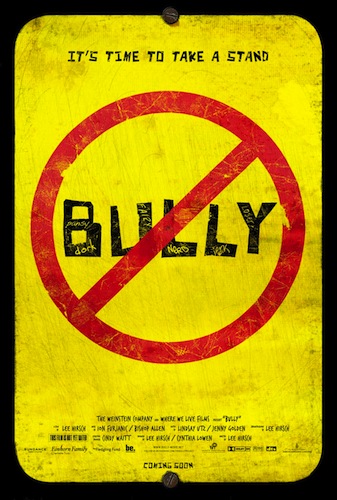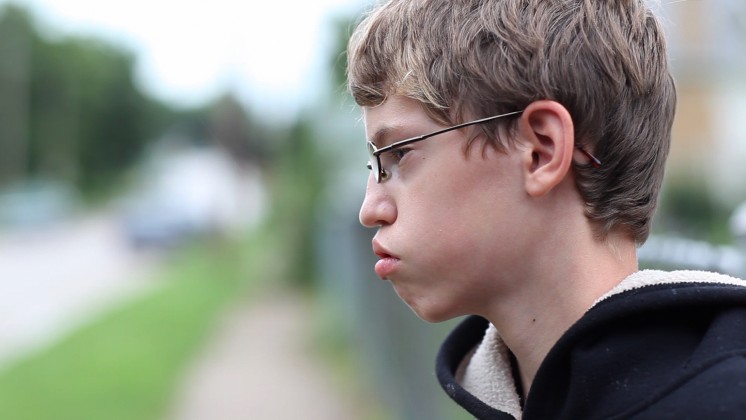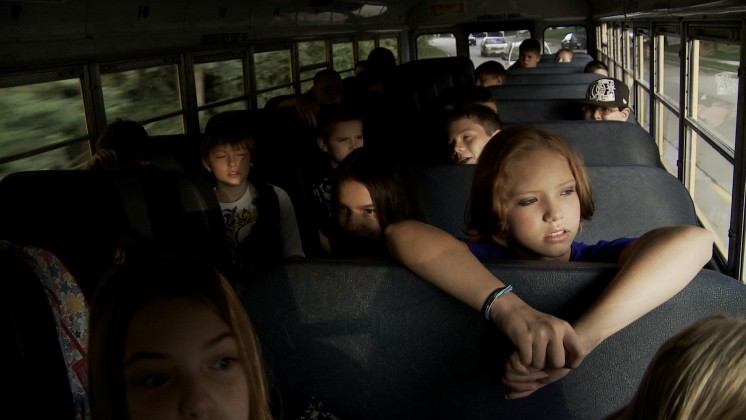
BULLY is a painful film to watch at times, and it’s not because Lee Hirsch’s documentary is a bad film by any means. However, it is rough to watch the constant bullying of the kids whose stories are told without feeling helpless and without feeling some sort of compassion for the torture these poor children are enduring for no other reason than they’re different from what might be considered “normal” by some. These are kids who’re simply trying to go to school to learn yet can’t, because they’re not safe the second they walk out of their own homes. They’re targets on the school bus. They’re targets in the hallways. They’re targets in the classrooms, and what’s most upsetting about BULLY is that nothing is being done to stop it. There is nothing being done to curtail the behavior or change the culture that’s long accepted it as “kids being kids.” However, to those who want to accept it as so, because it’s been that way for a long time (which doesn’t make it necessarily right), it’s not “kids being kids” when someone is pushed to the edge where they bring a gun to school to stand up for themselves or taken that further and shot up their school to exact revenge on those who’ve gotten them to that point or tragically taken their own lives, because their self-worth is non-existent due to the constant reminders that they are inferior.
BULLY follows five different stories of those who have been the victims of bullying. Two of them revolve around the families of kids – one 17 years old, the other only 11 – who committed suicide due to chronic abuse at the hands of bullies. These accounts deal more with the families’ places in the anti-bullying movement, and, while they lend some credence to the fight being publicly taken by some for school administrators to do something more, the impact here mostly comes from parents talking about the loss of their children. As a father, I cannot even begin to imagine the horror of burying your child, let alone finding them in the state of having taken their own life. Just thinking about it makes me upset. It bothers me even further as someone who has battled depression in the past and entertained thoughts of suicide in my younger days, back when I really didn’t know any better, back when I thought that my teenage years were the be-all and end-all of my existence. It bothers me to think that I could have ever done something like that or been taken to that limit by whatever I was feeling and how it would have affected my family. It’s that type of raw emotion that BULLY touches upon in watching these stories play out.
A couple of other stories deal with bullying done to females – one victimized as a result of her sexual orientation and the other it seems just because. There’s a strong support system behind each, which help show that there are people to champion those who are being treated poorly by others, but there’s a bit of weakness to these tales. The first, Kelby, is told mostly through personal accounts of her experiences, and, while it’s disgusting to hear of people treating her in such a discriminatory way, it lacks the impact of seeing the bullying taking place with your own eyes. Ja’Meya, the latter, does have some footage from a surveillance camera on the bus, of her pulling a gun on her classmates to make a stand against her bullies, but you don’t get a clear look as to what took place, outside of the audio. Therefore, it feels as if there’s an element to it missing that really gives you the full gravity of the situation.

The story of Alex though is easily the film’s strongest story. Here you have a 12 year old who’s referred to by his peers as “Fish Face,” because of his appearance. He might be a slightly odd looking boy, a little awkward… but he’s 12. Who isn’t at that age? Hirsch not only gets the most access to seeing the bullying of Alex, but he also has access to the Assistant Principal at his school in Sioux City. This presents quite the interesting portrayal of bullying from those drastically different sides, because, from Alex’s perspective, which we share with him, he’s literally beaten on a daily basis. Kids are punching him, stabbing him, threatening him, sitting on his head, doing everything they think they can get away with for the sheer purpose of picking on a weaker kid. It’s cruel to watch someone be treated like this, and it’s made even worse by the fact that he really doesn’t have any friends or anyone to stand up for him. In fact, he actually thinks those who are doing these things to him are his friends, because, without them, he wouldn’t have any connection or interaction to anyone outside of his family.
On the other side, there’s the Assistant Principal who denies that any sort of bullying problem even exists. She’s willing to force apologies between children in order to feel like she’s doing something and then turning the victim into the offender when he’s not all that pleased about making peace with the kid who was just beating the shit out of him not more than five minutes ago. She’s an ostrich with her head planted some firmly in the sand, she’s oblivious as to what is really happening amongst her students. And that’s really where BULLY gets you. We can see with our own eyes what Alex is going through, and, even with the presence of these cameras and knowing that releases clearly had to be signed allowing the likeness of these kids in school to be used, it doesn’t stop them from continuing to bully him. Even knowing their actions are being captured and documented, they still can’t help themselves. They do it anyway.
Where BULLY loses a bit of its message is that all of its stories take place in the Midwest or in the South. There’s no representation (not that they’d want any) of bullying taking place on the coasts or in major urban areas. As a result, BULLY feels a bit one-sided at times, because it becomes easy to point to these instances happening in these parts of the United States and have it feed into certain stereotypes about the types of behavior that’s considered acceptable there. “New York City and Los Angeles are far more cultured, so clearly bullying doesn’t happen there. It only takes place in these places, where the people don’t know any better.” There’s a lesbian being treated unfairly in Oklahoma…? Go figure. Bullying isn’t a problem that lives along geographical lines, and, because of this failure to show its wide reach in different parts of the country, BULLY then opens itself up to criticism that it’s bullying those areas. It may not be the case, but unnecessary weight is given to that argument by not showing bullying in a variety of places.

Bullying has gotten worse than what it was when I was a kid, either wrongly picking on someone else or having karma get me back in being the one picked on. Back then, it may have happened at school, but that’s also where it ended. Now, you’ve got people bombarded each other with bullying texts or emails, Facebook messages or wall posts are being left that keep it going, tweets about you continue the damage as you sit at home. There is no escape from it, and that increases the effect it’s having on people who are the victims of bullying. They can no longer choose to avoid it, because it’s begun following them. Just the other day, I happened to catch THE BREAKFAST CLUB on late at night, and, as each of them are relaying their stories about what landed them in Saturday detention, it was Andrew (Emilio Estevez) recalling his actions that really had me thinking about where the younger generation stands today in regards to things like bullying. Him taping Larry Lester’s buns together causes humiliation for some poor kid who happened to be in the wrong place at the wrong time and too hairy to boot… and that was back in 1985. If that were to happen today, you know that someone would have whipped out their phone and recorded the whole thing before rushing home to post it on YouTube, making that degradation even worse.
It’s somewhat promising to see the younger generation fighting for more acceptance and awareness. There’s a greater sense of equality among everyone that rests with that age group than that rests with mine, which is pretty progressive on issues like racial equality, gay marriage, etc. Therefore, there is hope that their acknowledgement of this bullying problem and a drive to do something about it can achieve meaningful action to stop it. However, this is also the same generation that has taken bullying to another level, so we may be looking at a stalemate that keeps the status quo deteriorating even further over time. But BULLY, for its part, at least opens you up to the harsh reality of what is taken place between the bullies and the bullied. I think some of Hirsch’s choices for the film weaken the message he’s trying to make periodically, but, with something as strong as Alex’s story at the heart of the film, BULLY is an emotional watch that calls your attention to a problem that really needs to get better before it gets any worse.
-Billy Donnelly
"The Infamous Billy The Kidd"
Follow me on Twitter.
![]()
